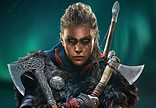Community

Articles
Out of the Shadows: An Opinion on the Shifting Narrative of Assassin's Creed
Save 10% on officially licensed Assassin's
Creed Origins merchandise with the code "TOWCB"
Top Stories
30/8/21 By Mike Smith Edited by Ashlea Buckley
Recently, Assassin’s Creed Valhalla was updated with its second DLC Expansion, The Siege of Paris. This story takes Jarl Eivor Varinsdottir to Francia in hopes to stop Charles the Fat from invading England.
Within this release was a side mission titled “Hidden”, a quest requiring players to open the Assassin’s Bureau in Paris. Evior is tasked with collecting three keys to access the satellite location of the Assassins Brotherhood, only to find it abandoned. This was to be expected of course, as back home in England, the Assassin Brotherhood had been absent for centuries after an order to return to Cologne by the ranking Master Vitas was issued due to a power vacuum caused by the overstepped actions of the Assassins, an absence that would remain until Basim Ibn Ishaq and his acolyte Hytham arrived alongside Eivor.
The Assassins were an endangered class of secret warriors and it appeared that their lack of representation in “Assassin’s Creed” was beginning to irritate long-term fans of the series. A lack of skills such as stealth and the traditional story of the Assassins Brotherhood vs the Templar Order were no longer the driving force to the game's narrative.
This was most prominent after the AC games moved to the “RPG Era” of their series. Three games where the stealthy protagonist was replaced by an Egyptian cop, a Spartan mercenary, and a Norse shieldmaiden. Stories of a secret war in the shadows of history replaced by Epics of revenge, self-discovery, and faith.
The creator of Assassin’s Creed, Patrice Desilets stated in an interview that in the current age of gaming, stealth was no longer possible as consoles were becoming more and more powerful, making it difficult to create a realistic stealth game. In honest terms, RPG games that last for hundreds of hours are trendy and make companies more money than the niche stealth titles once did. To the die-hard fans, this left some in the past like their beloved bureaus, collecting dust in memories of the past, hoping for a return to form.
The first eight titles (including spin-off games) introduced the Assassin Order, and taught players the skills of Master Assassins Ezio Auditore da Firenze and Altaïr Ibn-La'Ahad, whilst also exploring the tenets of their Creed. Next came the ways of the Templar Order told over five titles, explaining their operations and propaganda to show the player that they were not the bad guys, but simply had a differing ideology. This also introduced the idea of birth vs. choice within both the Brotherhood and the Order.


Where this article comes to the opinion of myself, is in the latest three titles, an opinion made after seeing the Ubisoft team that works on the Assassin’s Creed series’ game plan for future DLC and the recent announcements of more transmedia stories. Stated simply, the story must be progressed with a shift in focus towards a third party, the Isu race.
While AC Origins established the backbone to the creation of the Assassin Brotherhood via the Hidden Ones and their leader Amunet, it wasn’t until the post-game that a proto-Assassin group was introduced and their creed established. Gameplay moved to a more combat focused style with skill trees and gear sets, over the expected gameplay of gear and evasive movement and tools to work from the sidelines of battle.
The next title, Assassin's Creed Odyssey, which took place nearly 360 years before Origins dove into the lore of the Isu by telling the Greek Epic of Kassandra of Sparta, a demi-god trying to discover the secrets of her heritage and stop a hidden organization known as the Cult of Kosmos. From this title came the “Fate of Atlantis” DLC which put the misthios (mercenary) in the pantheon of the Isu, the Gods of Greek Mythology. Following this was the age of the Vikings and the journey of Eivor (mentioned before) as she worked to establish a home for her people in England while on the side assisting the Hidden Ones from outside their order.
With the inclusion of transmedia stories, the Assassins vs Templar had shifted to the budding seed of a bigger war, Man vs God. While the story of the Assassins was still present (Bayek & Amunet, Darius, and Basim & Hytham), the new characters (Kassandra, Eivor, & Geirmund of Geirmund’s Saga) were locked in wars of nations (The Peloponnesian War & the Norse Invasion of Europe).
What links all of these warriors from the RPG titles is their belief in the Gods. Egyption, Greek, and Norse Gods that in the lore of Assassin’s Creed were known as the Isu. The Isu are a race of pre-human beings powered by divine abilities and tools known as the Pieces of Eden. Both the Assassin’s and the Templars fight over discovering and collecting these tools to overpower the other and either save or control the world from the destructive nature of the Isu’s creations.

Focused now on exploring this outside party, the Isu’s humanity and corruption as a people and puppeteers of the Genetic Memories that were witnessed with the RPG protagonists is simply the next stepping stone in lore and world building. These are times where choice and belief in higher powers, victory in battle and the search for wealth were more culturally driven than the secret war of the previous 10 years of games.
Whilst Ubisoft works on the next stage of the series with Assassin’s Creed Infinity, an entry that is seeming to move towards a live service, the Assassins we have come to love have been provided a new home in the various mediums of transmedia, showing that the series and its historical timeline is not always controlled in secret, but sometimes by the actions of warriors seeking a seat at the table of the gods.
With future content being released across transmedia, which includes the games, Ubisoft should take what their fans are saying about the lack of Assassins in the main staple of the series (the games) but fans should also take into consideration the effort and world building that is put into transmedia as some of these stories would not translate well to a game or add-on. The other benefit of these tales is that you get to experience the world through the eyes and minds of multiple authors and artists while you learn more about the characters and location with descriptive detail and inner thoughts which give a more fulfilling experience.
In time, I hope a balance of story and traditional mechanics, such as the return of the stealthy nature of the original games, can be reached to bring life back to the abandoned bureaus and the fans of the past back to the wonderful fold of the Assassin’s Creed series. With how great the community is and how supportive it is within itself, I have enjoyed my time with the world of AC and seeing how what started as a game in the shadows of the major AAA games has become a beacon for adventure in the annals of history.
















Top Stories

Mike Smith is a collector of all things Assassin's Creed and a major supporter of the transmedia platform for the series.
With nearly a full library of Assassin's Creed media, he is exploring the universe in order of Genetic Memory, and waiting eagerly for the next story to be released.
Mike joined the program in 2021 as an Online Article Writer, and has a section dedicated to his work in the Community Hub.
About the Author





